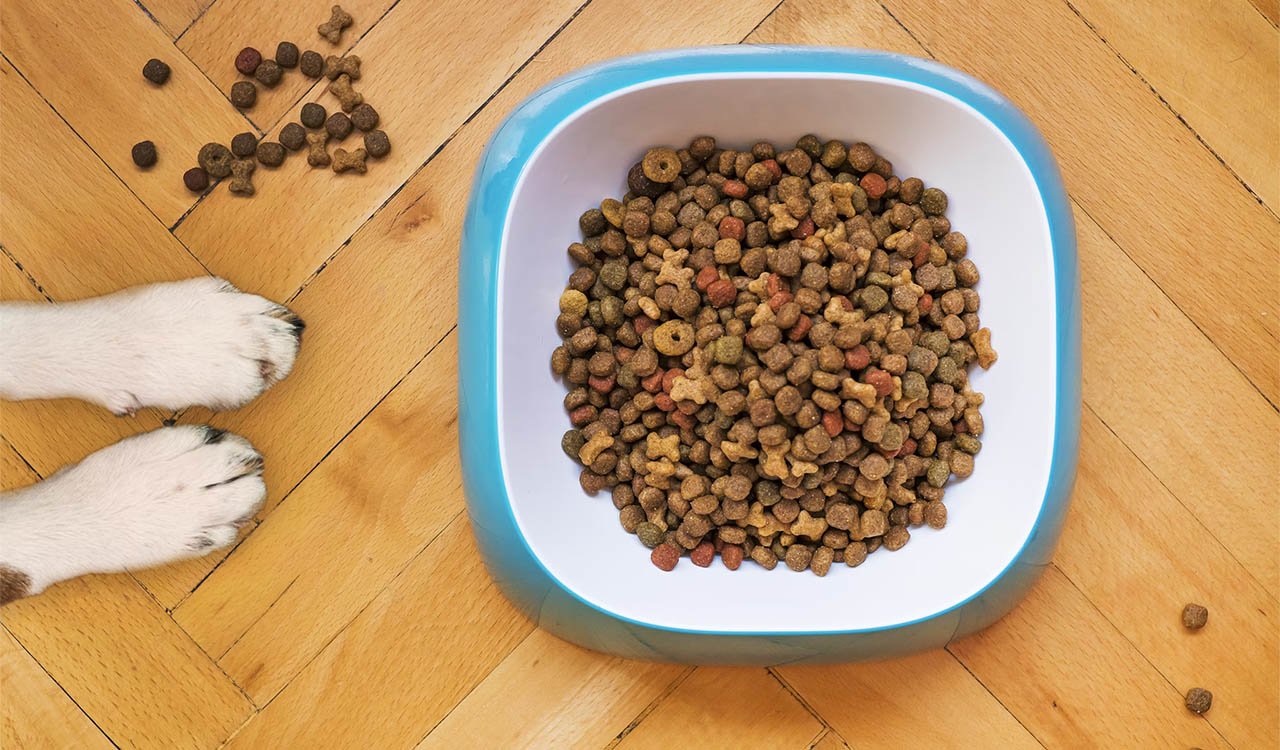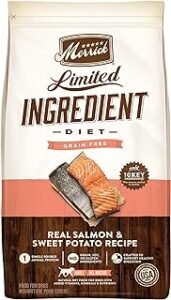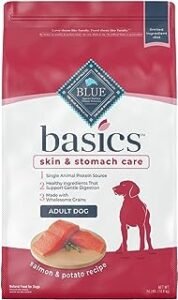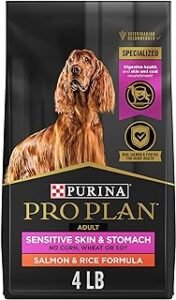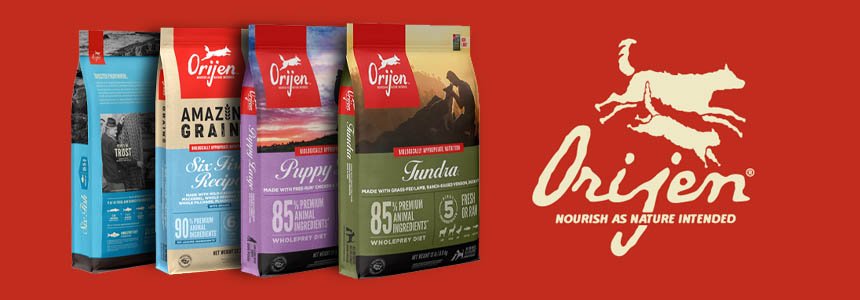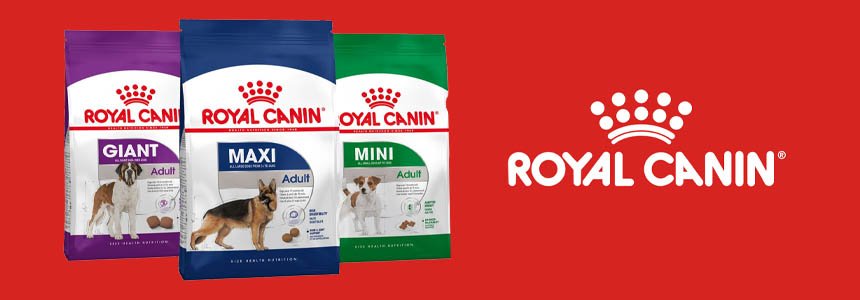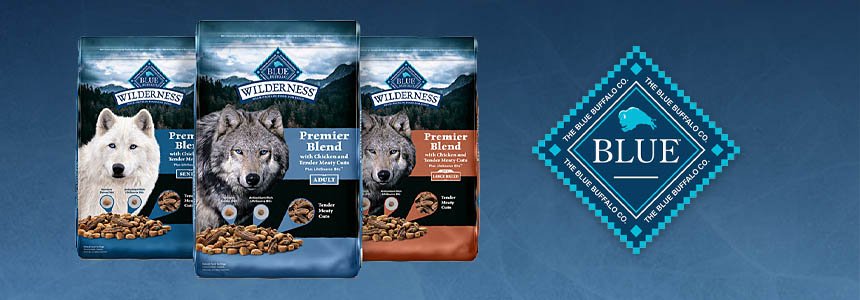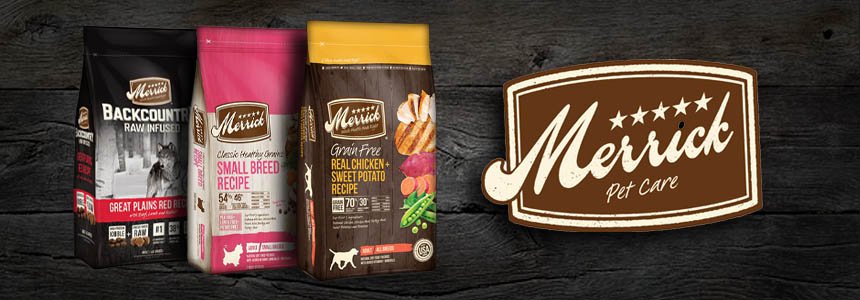Choosing the next level dog food for your best friend can be one of the most important decisions you will ever make as a pet owner.
The right diet can promote health, energy, and longevity, while the wrong one can lead to a host of problems. With countless options available, from grain-free formulas to raw diets, finding the next level dog food best suited for your best friend can be overwhelming.
This complete dog food guide will walk you through everything you need to know in order to make an informed choice, from understanding dog nutrition to evaluating different types of dog food. In this guide, we’ll also explore some of the top dog food brands that ensure a balanced diet, promote optimal health, and cater to your pup’s specific dietary needs.
Whether you’re a new pet parent or a seasoned dog lover, our guide will help you navigate the best options to keep your furry friend happy and thriving for years to come. Also be sure to also check out our guide to controlling ant problems in your home… since dog’s can be messy eaters!

Understanding Your Dog's Nutritional Needs
The Basics of Canine Nutrition
Dogs are omnivores, which means they need a balanced diet consisting of proteins, fats, carbohydrates, vitamins, and minerals. Here’s a breakdown of these essential nutrients:
🥩 High Quality Proteins
Essential for growth, muscle development, and overall body maintenance. High-quality protein sources include meat, fish, eggs, and legumes.
🥑 High Quality, Healthy Fats
Provide energy, support cell function, and promote healthy skin and coat. Look for sources like chicken fat, fish oil, and flaxseed oil.
🍎 High Quality Carbohydrates
Carbohydrates supply energy and aid in digestion, common sources of carbs include quality grains, vegetables, and fruits.
🔠 High Quality Vitamins and Minerals
Vital for various bodily functions, from immune response to bone development. Ensure the food includes a range of vitamins (A, B, C, D, E, K) and minerals (calcium, phosphorus, potassium, etc.).
A Dog's Life Stages and Special Needs
Your dog’s nutritional needs evolve significantly as they progress through different stages of life. To ensure they remain healthy and vibrant, it’s essential to consider the various life stages and any special dietary requirements they may have at each phase:

Puppy Specific Dietary Needs
Puppies, being in their formative stages, require a meticulously balanced diet to support their rapid growth and development. Understanding their specific nutritional needs is crucial to ensure they thrive during this critical phase of life.

High-Calorie Requirement
Puppies have significantly higher energy requirements compared to adult dogs due to their active growth phase. A diet rich in calories derived from a balanced combination of protein, fat, and carbohydrates is essential. This balance ensures sustained energy levels without compromising on essential nutrients.
Protein for Growth and Development
Protein plays a pivotal role in muscle development, tissue repair, and overall growth. Look for puppy formulas that contain at least 22-32% protein. High-quality animal-based proteins such as chicken, turkey, or fish are preferable as they provide essential amino acids necessary for optimal growth.
Essential Fats for Energy and Brain Health
Fat is a concentrated energy source vital for a puppy’s high metabolic demands. Additionally, certain fats, such as docosahexaenoic acid (DHA), are crucial for brain and eye development. DHA is commonly found in fish oil and specific types of algae. Ensure the puppy formula contains 8-20% fat, with an emphasis on healthy sources like omega-3 fatty acids.
Balanced Calcium and Phosphorus Levels
Calcium and phosphorus are fundamental for developing strong bones, teeth, and a sturdy skeletal structure. However, it’s vital to maintain a proper ratio of these minerals to prevent skeletal abnormalities. Excessive or insufficient amounts of calcium can lead to skeletal issues like hip dysplasia or bone deformities.
Frequent Feeding Schedule
Puppies thrive on a regular feeding schedule to maintain stable energy levels and support their continuous growth. Aim for feeding them 3-4 times a day, ideally spaced out to prevent digestive issues and ensure optimal nutrient absorption.
Nutrient-Dense Formulas
Choose puppy formulas specifically formulated to meet the unique nutritional needs of growing puppies. These formulas are designed to provide a balanced blend of vitamins, minerals, and antioxidants essential for overall health and immune system support.
Gradual Transition to Adult Food
As puppies mature, their nutritional requirements change. Gradually transition them from puppy food to adult food based on their breed size and growth rate. Consult with a veterinarian for personalized dietary recommendations as your puppy transitions into adulthood.
By thoroughly understanding and diligently implementing these nutritional guidelines, you can ensure that your puppy receives the essential nutrients required for optimal growth, development, and lifelong well-being.
Providing your puppy with a balanced diet tailored to their specific needs not only supports their healthy development but also lays a strong foundation for a vibrant and healthy life. Ensuring your puppy gets the right nutrition is crucial for their physical and mental development, helping to prevent health issues and promoting overall wellness. Follow these guidelines to give your puppy the best start in life, setting them up for a future filled with energy, vitality, and happiness.
Adult Dog Dietary Needs
Adult dogs have different nutritional requirements compared to puppies, focusing more on maintaining optimal health and supporting their activity levels. Below is a comprehensive list of things to know in order to ensure your adult dog’s diet meets their specific needs.

Balanced Nutrition for Maintenance
Adult dogs require a balanced diet that provides essential nutrients while supporting overall health and energy levels. Look for formulas that offer a balanced combination of protein, fats, carbohydrates, vitamins, and minerals tailored to meet adult dogs’ nutritional needs.
Protein Quality and Quantity
Protein remains crucial for adult dogs to maintain muscle mass, support immune function, and sustain energy levels. Opt for formulas with high-quality protein sources such as chicken, beef, lamb, or fish. Aim for a protein content of around 18-25% in their diet, depending on their activity level and health status.
Moderate Fat Content
Fat provides energy and aids in nutrient absorption. However, the fat content should be moderate to prevent weight gain and maintain a healthy body condition. Look for formulas with around 10-15% fat, derived from healthy sources like chicken fat or fish oil, which also provide essential omega-3 fatty acids.
Carbohydrates for Energy
Carbohydrates serve as a source of energy for adult dogs. Opt for complex carbohydrates like whole grains (brown rice, oats) and vegetables (sweet potatoes, peas) that offer fiber, vitamins, and minerals while promoting digestive health.
Joint Support and Antioxidants
Many adult dogs benefit from added joint-supporting ingredients such as glucosamine and chondroitin to maintain mobility and joint health. Antioxidants like vitamins C and E help support their immune system and protect against cellular damage.
Weight Management
As dogs age into adulthood, weight management becomes crucial to prevent obesity-related health issues. Choose formulas labeled for weight management or adjust portion sizes based on your dog’s activity level and body condition score.
Regular Exercise and Veterinary Check-ups
Alongside a balanced diet, regular exercise and veterinary check-ups are essential for maintaining your adult dog’s overall health and well-being. Consult with your veterinarian for personalized dietary recommendations and health assessments.
By providing your adult dog with a nutritionally balanced diet, regular exercise, and proper veterinary care, you can ensure they lead a healthy, active, and fulfilling life.
Senior Dog Dietary Needs and Guidelines
As dogs age, their nutritional needs evolve to support their changing physiology and to manage age-related health issues. Here’s an in-depth look at the specific dietary requirements for senior dogs to ensure they age gracefully and maintain their health and vitality.
Senior Dog Age-Appropriate Formulas
Transitioning to a senior-specific formula is beneficial as it addresses their changing nutritional requirements. Senior dog foods typically contain lower calories to prevent weight gain, reduced fat content, and added nutrients to support aging joints, digestion, and overall well-being. These formulas are designed to provide balanced nutrition while addressing the specific needs of older dogs.
Quality Protein for Muscle Maintenance
Maintaining muscle mass is crucial for senior dogs to support their mobility and overall health. High-quality protein sources, such as chicken, fish, or eggs, are essential. Senior dogs require around 18-25% protein in their diet, depending on their health status and activity level. Adequate protein intake helps prevent muscle wasting and supports the immune system.
Senior Dog Joint Support and Mobility
Joint health is a significant concern for senior dogs, who may suffer from arthritis or decreased mobility. Look for dog food enriched with glucosamine and chondroitin, which are known to support joint health and reduce inflammation. Omega-3 fatty acids from sources like fish oil also help to maintain joint flexibility and reduce discomfort associated with aging joints.
Senior Dog Digestive Health
Senior dogs often experience digestive issues, such as decreased nutrient absorption or sensitivity to certain ingredients. Foods with easily digestible proteins, fiber-rich sources like brown rice or sweet potatoes, and added probiotics can support digestive health. These ingredients help maintain a healthy gut flora, enhance nutrient absorption, and reduce gastrointestinal discomfort.
Senior Dog Weight Management
As dogs age, their metabolism slows, and they may become less active, making them prone to weight gain. Monitoring their weight regularly and adjusting their diet as needed is crucial. Senior dog foods often have a reduced calorie content to help manage weight while providing essential nutrients. Maintaining a healthy weight is vital for reducing the risk of obesity-related health issues like diabetes, heart disease, and joint problems.
Nutrient-Dense and Easy-to-Chew Formulas
Senior dogs benefit from nutrient-dense formulas that provide a concentrated source of essential vitamins, minerals, and antioxidants. These nutrients help support their immune system and overall health. Additionally, consider foods that are easy to chew, as dental issues can be common in older dogs. Smaller kibble sizes or soft-textured options can make eating more comfortable for senior dogs with dental problems.
Regular Veterinary Check-ups
Regular veterinary check-ups become even more crucial for senior dogs. These check-ups help monitor their overall health, address any age-related issues, and adjust their diet or medications as necessary. Your veterinarian can provide personalized dietary recommendations based on your senior dog’s specific needs, ensuring they receive the best possible care.
By providing your senior dog with a nutritionally balanced diet tailored to their age and health status, along with regular veterinary care and appropriate lifestyle adjustments, you can help them age gracefully and enjoy a happy, healthy life.
Special Health Conditions in Dogs
Dog Allergies and Sensitivities
Hypoallergenic Diets
For dogs with food allergies or sensitivities, hypoallergenic diets with limited ingredients can help identify and manage problematic foods. These diets often contain fewer potential allergens, making it easier to pinpoint and eliminate triggers.
Common Allergens
Ingredients that frequently cause allergies include beef, dairy, wheat, egg, chicken, lamb, soy, pork, rabbit, and fish. Monitoring and avoiding these common allergens can significantly reduce allergic reactions.
Novel Proteins and Grain-Free Options
Utilizing novel proteins like duck, venison, or bison can help manage allergies. Grain-free diets, which use alternative carbohydrates such as sweet potatoes or peas, can be beneficial for dogs with grain sensitivities.
Diabetes in Dogs
High-Fiber, Low-Sugar Diets
Diets rich in fiber and low in sugar help regulate blood sugar levels in diabetic dogs. High fiber content slows down glucose absorption, aiding in blood sugar control.
Consistent Feeding Schedule
Maintaining a consistent feeding schedule is crucial for stabilizing glucose levels. Regular, timed meals help prevent blood sugar spikes and dips, promoting better overall management of diabetes.
Renal Disease in Dogs
Low-Protein, Low-Phosphorus Diets
Diets low in protein and phosphorus reduce the workload on the kidneys, helping to manage renal disease more effectively. These diets minimize the production of waste products that the kidneys need to filter.
Omega-3 Fatty Acids
Including omega-3 fatty acids in the diet supports kidney health by reducing inflammation and promoting better renal function.

Weight Management for Dogs
- Low-Calorie, High-Fiber Diets: For senior dogs needing weight management, low-calorie diets rich in fiber can help with weight loss or maintenance. These diets provide a feeling of fullness without extra calories, aiding in weight control.
- Satiety-Enhancing Formulas: Formulas designed to promote satiety ensure that dogs feel satisfied and less inclined to overeat, supporting healthier weight management.
Digestive Issues in Dogs
- Easily Digestible Diets: Diets with easily digestible ingredients, such as rice and pumpkin, soothe the digestive tract and promote better nutrient absorption. These diets are ideal for dogs with sensitive stomachs or chronic digestive issues.
- Prebiotics and Probiotics: Including prebiotics and probiotics in the diet supports a healthy gut flora, improving digestion and overall gastrointestinal health.
Cardiac Issues and Heart Health for Dogs
- Low-Sodium Diets: Low-sodium diets are essential for dogs with heart conditions, as they help manage blood pressure and reduce the strain on the heart.
- Added Taurine and Omega-3 Fatty Acids: Taurine and omega-3 fatty acids support cardiovascular health by promoting heart function and reducing inflammation, which is particularly beneficial for senior dogs with cardiac issues.
Liver Disease in Dogs
- Low-Fat, High-Quality Protein Diets: Dogs with liver disease benefit from diets low in fat and high in easily digestible, high-quality proteins. These diets reduce the liver’s workload and provide essential nutrients without causing further strain.
- Added Antioxidants: Antioxidants such as vitamin E and C support liver health by reducing oxidative stress and inflammation, helping to maintain liver function.
Arthritis in Aging Dogs
- Joint Support Formulas: Senior dogs with arthritis benefit from diets enriched with joint-supporting ingredients like glucosamine, chondroitin, and omega-3 fatty acids. These nutrients help reduce inflammation and improve joint health and mobility.
- Anti-Inflammatory Ingredients: Diets containing natural anti-inflammatory ingredients, such as turmeric and green-lipped mussel, can help manage arthritis pain and improve quality of life.
Consult Your Vet For Guidance
Always work closely with your veterinarian to diagnose and manage special health conditions in your senior dog. Your vet can recommend the best dietary options tailored to your dog’s specific needs, ensuring they receive optimal care and nutrition.
By addressing these special conditions with carefully tailored diets, you can help your senior dog maintain their health and enjoy a higher quality of life. Regular veterinary consultations are essential to monitor their condition and adjust their diet as needed.
The Different Types of Dog Food
Dry Dog Food (Kibble)

Dry dog food, or kibble, is one of the most popular choices due to its convenience and long shelf life. It’s available in various formulas, including options for different life stages, breeds, and health conditions. High-quality kibble can provide balanced nutrition and contribute to dental health by reducing plaque buildup. However, it’s important to choose brands that use high-quality ingredients and avoid excessive fillers and artificial additives. Brands like Orijen and Blue Buffalo offer premium kibble options that prioritize real meat and whole foods.
Pros of Dry Dog Food
- Convenient and easy to store, long shelf life.
- A very wide variety of options to choose from
- Often the most economical type of dog food
- Helps to keep teeth clean.
Cons of Dry Dog Food
- Can be less palatable for some dogs.
- Often contains fillers and preservatives.
Wet Dog Food (Canned)
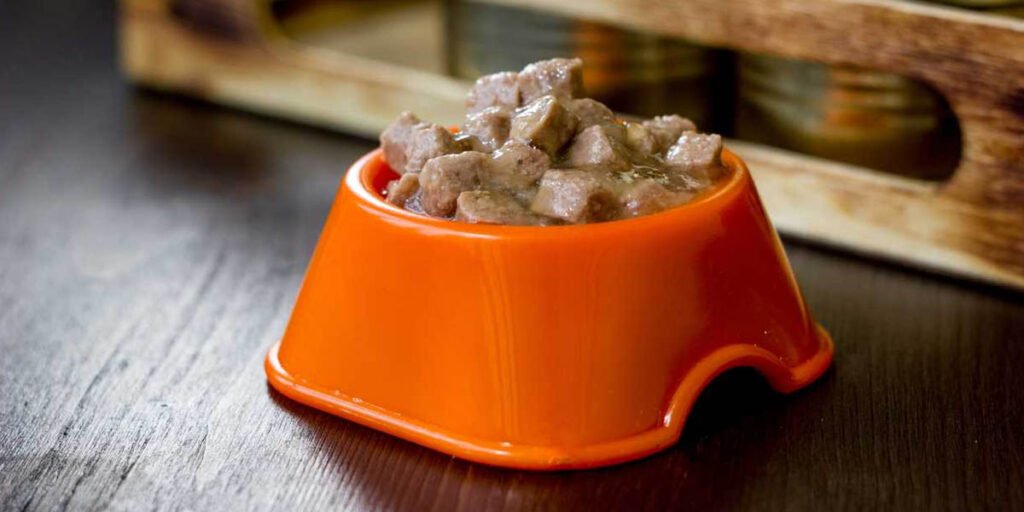
Wet dog food, or canned dog food, is often more appealing to dogs due to its rich aroma and texture. It provides added moisture, which can be beneficial for dogs that don’t drink enough water. Wet food is particularly good for picky eaters and older dogs who may have difficulty chewing. However, it can be more costly and less convenient than kibble. Brands like Wellness and Merrick offer high-quality canned foods made with real meat and vegetables, free from artificial preservatives.
Pros of Wet Dog Food
- Highly palatable and hydrating.
- Generally fewer preservatives.
Cons of Wet Dog Food
- More expensive.
- Shorter shelf life once opened.
Semi-Moist Dog Food

Semi-moist dog food is a middle ground between dry and wet food. It’s convenient and often more palatable than kibble, making it a good option for finicky eaters. However, semi-moist food often contains higher levels of sugars and artificial ingredients, which can be detrimental to your dog’s health over time. It is generally recommended to use semi-moist food as an occasional treat rather than a primary diet.
Pros of Semi-Moist Dog Food
- Palatable and convenient.
- Often more appealing than dry food.
Cons of Semi-Moist Dog Food
- Typically contains artificial colors, flavors, and preservatives.
- Not as nutritionally balanced as other options.
Freeze-Dried and Dehydrated Dog Food
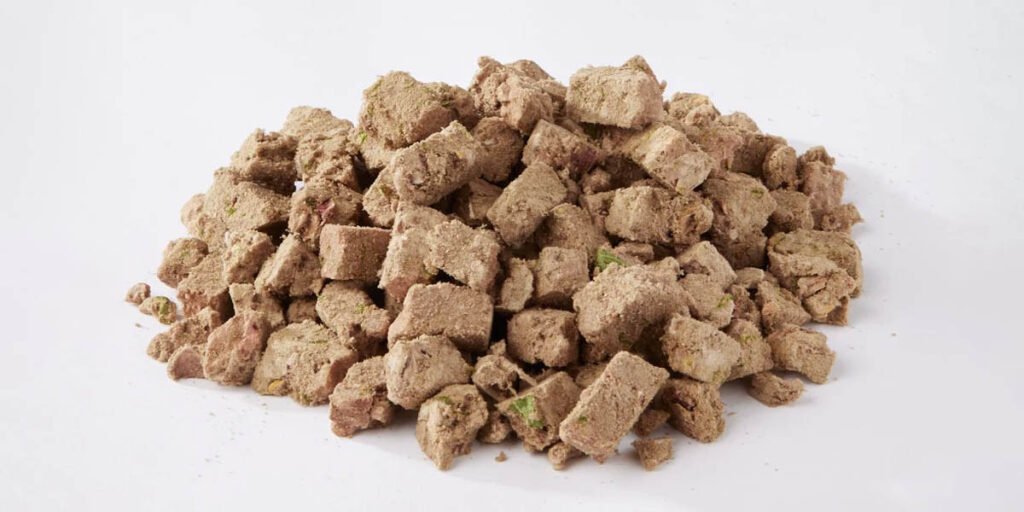
Freeze-dried and dehydrated dog foods offer the nutritional benefits of raw food with the convenience of dry food. The freeze-drying process preserves the majority of the nutrients and flavors, making these foods highly palatable and nutritious. These options are particularly good for maintaining a raw diet while traveling or when convenience is a priority. Before feeding, the food needs to be rehydrated, which can add a bit of preparation time. Brands like The Honest Kitchen and Ziwi Peak are known for their high-quality freeze-dried and dehydrated dog food products.
Pros of Freeze-Dried, Dehydrated Dog Food
- Long shelf life.
- Retains most nutrients.
Cons of Freeze-Dried Dog Food
- Expensive.
- Needs rehydration before feeding.
Raw Diet Dog Food
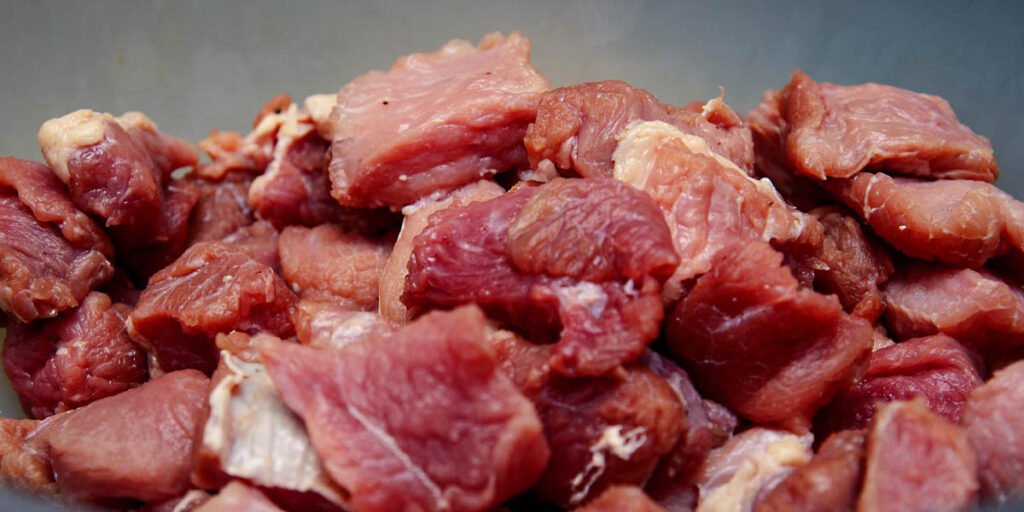
Raw dog food diets, also known as BARF (Biologically Appropriate Raw Food), aim to mimic the natural diet of wild canines. These diets typically include raw meat, bones, fruits, and vegetables. Advocates of raw feeding claim numerous benefits, such as improved digestion, healthier skin, and increased energy levels. However, preparing raw food requires careful handling to prevent bacterial contamination, and it can be significantly more expensive and time-consuming than other options. Brands like Stella & Chewy’s and Primal offer convenient, pre-prepared raw food options.
Pros of a Raw Diet For Your Dog
- Natural and highly digestible.
- Often results in shinier coats and better dental health.
Cons of a Raw Diet For Your Dog
- Risk of bacterial contamination.
- More preparation time and expense.
Homemade Dog Food Recipes and Tips

Feeding your dog homemade food can be an incredibly rewarding way to ensure they receive the highest quality, fresh ingredients tailored specifically to their needs. It allows you to have complete control over what goes into their meals, which can be especially beneficial for dogs with allergies or dietary sensitivities.
However, this approach requires a significant amount of time, effort, and knowledge to ensure the diet is nutritionally balanced and meets all of your dog’s dietary requirements. Preparing homemade dog food involves meticulous planning, careful ingredient selection, and precise portioning to maintain optimal health. Here’s a detailed guide on homemade dog food, along with some popular recipes to get you started on this wholesome journey.
Benefits of Homemade Dog Food
- Control Over Ingredients: You have full control over the ingredients, ensuring no artificial additives, preservatives, or fillers.
- Customization: You can tailor the diet to meet your dog’s specific needs, whether they have allergies, sensitivities, or particular dietary requirements.
- Quality Assurance: By selecting fresh, high-quality ingredients, you can be confident in the nutritional value and safety of your dog’s food.
Cons of Homemade Dog Food
- Time-Consuming: Preparing homemade dog food requires considerable time for planning, shopping, cooking, and portioning meals.
- Nutritional Balance: Ensuring a balanced diet is challenging. Dogs require specific vitamins, minerals, and nutrients that must be included in the correct proportions.
- Expense: High-quality ingredients can be costly, and the overall expense may exceed that of commercial dog food.
A balanced homemade diet should include
A balanced homemade diet for your dog should include a variety of essential components to ensure they receive all the necessary nutrients:
- Protein: Lean meats such as chicken, turkey, beef, and fish provide essential amino acids. Eggs are also an excellent source of high-quality protein.
- Carbohydrates: Sources like rice, potatoes, and oats offer energy and fiber, aiding in digestion and maintaining steady energy levels.
- Vegetables: Incorporate a range of vegetables such as carrots, peas, and green beans. These provide vitamins, minerals, and fiber, contributing to overall health and well-being.
- Fats: Healthy fats are crucial for skin and coat health, brain function, and energy. Include sources like fish oil and flaxseed oil to provide omega-3 fatty acids.
- Supplements: To ensure a well-rounded diet, add necessary supplements like calcium for bone health and multivitamins to cover any nutritional gaps.
By including these elements, you can create nutritious and balanced homemade meals for your dog. Here are some popular recipes to get you started:
Popular Homemade Dog Food Recipes

Chicken and Rice Delight:
Ingredients:
- 2 cups cooked white rice
- 1 cup cooked, boneless, skinless chicken breast, shredded
- 1 cup mixed vegetables (carrots, peas, green beans), steamed
- 1 tablespoon fish oil (for omega-3 fatty acids)
Instructions:
- Cook the rice according to package instructions.
- Steam the mixed vegetables until tender.
- Shred the cooked chicken breast.
- Combine the rice, chicken, and vegetables in a large bowl.
- Add the fish oil and mix well.
- Serve cooled and store the remainder in the refrigerator for up to 3 days.
Beef and Sweet Potato Stew:
Ingredients:
- 1 pound lean ground beef
- 1 large sweet potato, peeled and diced
- 1 cup chopped spinach
- 1/2 cup peas
- 2 cups water
- 1 tablespoon flaxseed oil (for omega-3 fatty acids)
Instructions:
- In a large pot, cook the ground beef over medium heat until browned.
- Add the diced sweet potato and water, bringing to a boil.
- Reduce heat and simmer until sweet potatoes are tender, about 15 minutes.
- Add the spinach and peas, cooking until spinach is wilted.
- Remove from heat and stir in the flaxseed oil.
- Let cool before serving. Store leftovers in the refrigerator for up to 3 days.
Turkey and Vegetable Medley:
Ingredients:
- 1 pound ground turkey
- 1 cup chopped carrots
- 1 cup chopped broccoli
- 1/2 cup brown rice
- 1 tablespoon olive oil
- 2 cups water
Instructions:
- In a large skillet, cook the ground turkey until browned.
- Add the chopped carrots, broccoli, brown rice, and water.
- Bring to a boil, then reduce heat and simmer until the vegetables and rice are tender, about 20 minutes.
- Stir in the olive oil and mix thoroughly.
- Allow to cool before serving. Store leftovers in the refrigerator for up to 3 days.
Ensuring Nutritional Balance
- Consult a Veterinarian: Before switching to homemade food, consult with your veterinarian to ensure you are meeting all your dog’s nutritional needs. They can provide guidance on necessary supplements and portion sizes.
- Use a Recipe Approved by a Veterinary Nutritionist: Following recipes formulated by veterinary nutritionists helps ensure the meals are balanced and complete.
- Incorporate Supplements: Dogs need certain nutrients like calcium, taurine, and omega-3 fatty acids, which may not be sufficiently present in homemade recipes. Adding supplements can help maintain a balanced diet.
The Reality of Homemade Dog Food
While homemade dog food can be beneficial, it is labor-intensive and requires careful planning to ensure nutritional adequacy. For many pet owners, the convenience and assurance of commercially prepared dog food, formulated to meet all dietary requirements, make it a preferable choice. High-quality brands, such as the ones advertised, offer nutritionally balanced meals that save time and effort while supporting your dog’s health.
By understanding the pros and cons and considering the effort involved, you can make an informed decision about whether homemade or commercial dog food is the best option for your furry friend.
Reading Dog Food Labels
Understanding how to read dog food labels is crucial for making an informed and healthy choice for your pet. By familiarizing yourself with the labeling, you can ensure you’re providing the best nutrition possible. Here are the key things to look for:
Ingredients List
- Named Protein Source: Look for specific meat sources like chicken, beef, or salmon rather than vague terms like “meat meal.”
- Whole Ingredients: Prefer whole grains, vegetables, and fruits over by-products and fillers.
- Avoid Harmful Additives: Steer clear of artificial colors, flavors, and preservatives like BHA, BHT, and ethoxyquin.
Guaranteed Analysis
This section provides the minimum percentages of crude protein and fat, and the maximum percentages of crude fiber and moisture. Compare these values to ensure the food meets your dog’s nutritional needs.
Nutritional Adequacy Statement
Look for a statement that says the food meets the nutritional levels established by the AAFCO (Association of American Feed Control Officials) Dog Food Nutrient Profiles. This indicates the food is complete and balanced for your dog’s life stage.
Special Considerations for Dogs with Allergies and Sensitivities

Identifying Food Allergies in Dogs
Common signs of food allergies in dogs include:
-
Itching, Scratching, and Gnawing: Excessive itching, scratching, or chewing at their skin or paws may indicate an allergic reaction. Dogs with allergies often exhibit these behaviors as a response to the irritation caused by allergens in their food. It’s essential to monitor these symptoms closely and consult with a veterinarian for proper diagnosis and management to ensure your dog’s comfort and well-being.
-
Gastrointestinal Issues: Dogs with food allergies may experience a range of gastrointestinal issues, including vomiting, diarrhea, or general digestive discomfort after consuming allergenic foods. These symptoms can be distressing for your dog and may lead to nutrient deficiencies if not addressed promptly. Working with your veterinarian to identify and eliminate the problematic food allergens is crucial for managing gastrointestinal issues effectively.
-
Ear Infections: Chronic ear infections or recurrent ear inflammation can sometimes be linked to food allergies. The inflammation triggered by food allergens can affect the ears, leading to discomfort, itching, and potential infections. Proper diagnosis and treatment of food allergies can help alleviate these ear-related issues and improve your dog’s overall comfort and quality of life.
-
Swelling of the Face or Paws: Allergic reactions can cause swelling, particularly around the face, muzzle, or paws. This swelling, known as angioedema, is a common allergic response and may be accompanied by redness, warmth, or discomfort. Prompt identification of the allergen and appropriate management are crucial to prevent severe reactions and ensure your dog’s safety and well-being.
Consulting Your Veterinarian
Always collaborate closely with your veterinarian to accurately diagnose food allergies and choose the most suitable diet for your dog. Your veterinarian may recommend conducting a food trial, which involves systematically introducing novel proteins and carbohydrates to identify and eliminate allergens.
Additionally, allergy testing, such as blood tests or skin tests, may be suggested to pinpoint the specific cause of your dog’s allergic reactions. By following your veterinarian’s guidance and expertise, you can ensure a thorough and effective approach to managing your dog’s food allergies and promoting their health and well-being.
Choosing Hypoallergenic Foods
If your dog has been diagnosed with food allergies or sensitivities, here are some options to consider:
-
Limited Ingredient Diets (LID): These diets feature a limited number of ingredients, typically a single protein source and a single carbohydrate source. By reducing the variety of ingredients, LID diets minimize the potential for allergens.
-
Novel Proteins: Novel protein sources are proteins that your dog hasn’t been exposed to before. Examples include duck, venison, rabbit, or kangaroo. These novel proteins are less likely to trigger allergic reactions in dogs with sensitivities to more common proteins like chicken or beef.
-
Grain-Free Formulas: Some dogs may have sensitivities or intolerances to grains like wheat, corn, or soy. Grain-free formulas substitute grains with alternative carbohydrates like sweet potatoes, peas, lentils, or tapioca. However, it’s essential to note that not all dogs benefit from grain-free diets, and recent studies have highlighted potential concerns regarding certain ingredients used in grain-free formulations.
-
Hydrolyzed Diets: Hydrolyzed protein diets involve breaking down proteins into smaller components, making them less likely to trigger allergic reactions. These diets are often recommended for dogs with severe food allergies or those who haven’t responded well to other dietary changes.
It’s crucial to work closely with your veterinarian to properly diagnose food allergies or sensitivities and determine the most suitable dietary approach for your dog. Veterinary guidance ensures that your dog’s nutritional needs are met while addressing their specific health concerns.
How to Transition to a New Dog Food
Switching your dog’s food abruptly can lead to digestive upset, including vomiting, diarrhea, and a decrease in appetite. To avoid these issues, it’s essential to transition gradually.
Follow these steps for a smooth transition
Gradual Transition
- Day 1-2: Mix 25% of the new food with 75% of the old food. This initial stage allows your dog’s digestive system to begin adjusting to the new ingredients.
- Day 3-4: Increase the new food to 50%, reducing the old food to 50%. This balanced mix helps your dog adapt further without overwhelming their system.
- Day 5-6: Mix 75% of the new food with 25% of the old food. By this stage, your dog should be more accustomed to the new food, making the final transition easier.
- Day 7: Serve 100% new food. Your dog should now be fully adjusted to their new diet.
Monitoring Your Dog
- Watch for Signs of Digestive Upset: Keep an eye on your dog for any signs of digestive issues such as vomiting, diarrhea, excessive gas, or a noticeable decrease in appetite. It’s crucial to monitor these symptoms closely during the transition period.
- Adjust the Transition Pace if Needed: If your dog shows any signs of digestive discomfort, slow down the transition process. Extend each stage by a few days to give their digestive system more time to adjust.
- Consult Your Veterinarian: If digestive problems persist despite slowing down the transition, or if your dog shows severe symptoms, consult your veterinarian. They can provide guidance and may suggest alternative dietary options or additional digestive aids.
Additional Tips
- Maintain a Consistent Feeding Schedule: Feed your dog at the same times each day to help regulate their digestive system.
- Introduce New Food Gradually to Picky Eaters: For dogs that are picky eaters, mixing a small amount of the new food with a favorite treat or wet food can help encourage acceptance.
- Ensure Proper Hydration: Make sure your dog has access to fresh water at all times, especially during the transition period, to help their digestive system adjust.
By following these steps and monitoring your dog’s response, you can ensure a smooth transition to their new diet, minimizing the risk of digestive upset and promoting better overall health.
Top-Rated Dog Food Brands
Orijen delivers biologically appropriate nutrition, mimicking the natural diet of wild canines. Made with fresh, regional ingredients, Orijen’s high-protein formulas feature a variety of meats, organs, and cartilage. Each recipe is designed to nourish dogs according to their evolutionary needs, ensuring peak health and vitality. Orijen’s commitment to using whole prey ratios and biologically appropriate diets makes it a top choice for discerning pet owners.
Orijen’s dedication to quality and innovation is reflected in their meticulous sourcing of ingredients and stringent manufacturing processes. Their grain-free recipes are ideal for dogs with food sensitivities, offering a diet that’s both nutritious and easily digestible. With Orijen, you can be confident that your dog is receiving premium nutrition that supports optimal health and well-being.
Biologically Appropriate
Mirrors the natural diet of wild canines.
High Protein
Packed with diverse animal ingredients.
Nutrient-Dense
Developed by nutritionists and veterinarians
Fresh, Regional Ingredients
Sourced from trusted suppliers.
WholePrey Ratios
Includes meat, organs, and cartilage.
Royal Canin is renowned for its tailored nutrition, designed to meet the specific needs of different breeds, sizes, and life stages. Developed with veterinarians and nutritionists, Royal Canin’s precise formulas support optimal health and well-being. Each product is crafted to address unique dietary requirements, from puppies to senior dogs, ensuring your pet receives the best possible nutrition.
Royal Canin’s high-quality ingredients and science-backed recipes are designed to support various health issues, including digestion, skin health, and joint support. Their commitment to innovation and research ensures that each formula is based on the latest scientific advancements in pet nutrition. With Royal Canin, you can be confident that your dog is getting nutrition that’s both precise and beneficial for their specific needs.
Breed-Specific Formulas
Nutrition tailored to the unique needs of different breeds.
Veterinary Expertise
Developed with veterinarians for optimal health support.
Precise Nutrition
Carefully balanced nutrients for every life stage and size.
High-Quality Ingredients
Premium ingredients for better health and well-being.
Specialized Care
Addresses specific health issues, from digestion to skin health.
Blue Buffalo stands out for its commitment to using only the finest natural ingredients. Each formula is packed with real meat, fruits, and vegetables, providing high-quality nutrition that dogs love. Blue Buffalo’s LifeSource Bits are a unique blend of antioxidants, vitamins, and minerals, supporting immune health and overall well-being. Their recipes are crafted to meet the specific needs of dogs at different life stages, ensuring they receive balanced, wholesome meals.
Blue Buffalo also prioritizes transparency and quality, with a promise to exclude any artificial preservatives, colors, and flavors from their products. Their grain-free options are perfect for dogs with food sensitivities, providing a diet that’s both nutritious and gentle on the stomach. Trust Blue Buffalo to deliver meals that help your dog thrive, with a taste they’ll love and nutrition you can rely on.
Natural Ingredients
Real meat, fruits, and vegetables in every recipe.
LifeSource Bits
Exclusive blend of antioxidants, vitamins, and minerals.
No Artificial Additives
Free from artificial preservatives, colors, and flavors.
Holistic Approach
Balanced nutrition for overall health and wellness.
Grain-Free Options
Ideal for dogs with grain sensitivities.
Merrick offers handcrafted recipes made in small batches to ensure quality and consistency. Using high-quality ingredients sourced from trusted farmers, Merrick provides balanced nutrition with a focus on real, whole foods. Each recipe is crafted to support overall health, including skin and coat, digestion, and energy levels. Merrick’s commitment to transparency and quality makes it a favorite among pet owners.
Merrick’s dedication to quality extends to their production processes, with each batch carefully tested to ensure safety and efficacy. Their recipes are designed to meet the specific needs of puppies, adults, and senior dogs, providing targeted nutrition that supports growth, maintenance, and aging. Choose Merrick for a dog food that’s both delicious and nutritious, made with care and expertise.
Handcrafted Recipes
Made in small batches for quality.
Real, Whole Foods
High-quality ingredients from trusted sources.
Balanced Nutrition
Supports overall health and well-being.
Skin and Coat Support
Omega fatty acids for a healthy coat.
Made in the USA
Produced in their own kitchens.
Wellness Complete Health offers holistic nutrition for your dog’s whole-body health. Each recipe is crafted with natural, high-quality ingredients to provide balanced nutrition and promote overall well-being. Wellness focuses on nutrient-rich ingredients and excludes artificial additives, ensuring that your dog receives wholesome meals that support long-term health.
Wellness Complete Health formulas are designed to cater to the specific needs of puppies, adults, and senior dogs, providing targeted nutrition that supports growth, maintenance, and aging. Their recipes include high-quality proteins, fruits, and vegetables, delivering essential nutrients that promote immune health, energy levels, and digestive health. Choose Wellness Complete Health for a comprehensive approach to your dog’s nutrition.
Holistic Nutrition
Balanced recipes for complete health.
Natural Ingredients
Made with high-quality, natural ingredients.
No Artificial Additives
Free from artificial preservatives, colors, and flavors.
Comprehensive Wellness
Supports immune health, energy levels, and digestion.
Expertly Crafted
Developed by nutritionists and veterinarians.
Instinct offers raw and natural dog food options that prioritize high-quality, minimally processed ingredients. Their raw diets provide nutrient-dense, high-protein meals that support optimal health and vitality. Instinct’s commitment to raw nutrition ensures your dog receives the benefits of a natural diet, including improved digestion, skin, and coat health.
Instinct’s recipes are crafted to meet the specific needs of different life stages, providing targeted nutrition that supports growth, maintenance, and aging. Their products are free from artificial preservatives, colors, and flavors, ensuring your dog receives wholesome, nutritious meals. Choose Instinct for a raw and natural approach to your dog’s nutrition, made with the finest ingredients.
Raw Nutrition
High-protein, minimally processed ingredients.
Nutrient-Dense
Supports optimal health and vitality.
Natural Ingredients
Free from artificial preservatives, colors, and flavors.
Life Stage Support
Formulas for puppies, adults, and seniors.
Health Benefits
Improved digestion, skin, and coat health.
Purina Pro Plan combines cutting-edge science and nutrition to deliver high-quality dog food tailored to various life stages and health needs. Trusted by pet owners and professionals alike, it offers specialized formulas to support optimal health and performance. Each recipe includes real meat as the primary ingredient, ensuring your dog gets the protein they need for muscle maintenance and energy.
Purina Pro Plan’s commitment to quality is evident in their rigorous testing and adherence to safety standards. Their products are designed to address specific health concerns, such as joint health, weight management, and digestive issues. With a wide range of options, including formulas for puppies, adults, and seniors, Purina Pro Plan ensures your dog receives the best possible care and nutrition.
Scientifically Advanced
Formulated with the latest nutritional science.
Specialized Formulas
Tailored to specific life stages and health needs.
High-Quality Ingredients
Real meat, poultry, or fish as the first ingredient.
Proven Results
Supports immune health, digestion, and skin and coat health.
Veterinarian Recommended
Trusted by professionals for optimal pet nutrition.
Taste of the Wild offers grain-free recipes with unique proteins like bison and venison, delivering high-quality nutrition inspired by your dog’s natural diet. Each formula includes nutrient-rich fruits and vegetables, providing antioxidants for overall health. With a focus on digestibility and flavor, Taste of the Wild ensures your dog enjoys every meal while maintaining optimal health.
Taste of the Wild’s commitment to quality ingredients and balanced nutrition makes it a popular choice among pet owners. Their recipes are crafted to provide complete and balanced nutrition, supporting your dog’s overall health and well-being. Whether your dog has food sensitivities or just loves the taste of unique proteins, Taste of the Wild delivers a diet that’s both delicious and nutritious.
Unique Proteins
Featuring bison, venison, and other novel proteins.
Grain-Free
Perfect for dogs with grain allergies or sensitivities.
Natural Ingredients
Rich in fruits and vegetables for added nutrients.
Digestibility
Highly digestible recipes for optimal nutrient absorption.
Great Taste
Flavors dogs love.
Nutro Ultra offers premium, natural dog food with a blend of high-quality proteins, whole grains, and nutrient-rich superfoods. Each recipe is designed to provide complete and balanced nutrition for your dog’s health and vitality. With no artificial preservatives, colors, or flavors, Nutro Ultra ensures your dog receives wholesome, nutritious meals that promote long-term health.
Nutro Ultra’s commitment to quality and transparency is reflected in their careful selection of ingredients and rigorous testing processes. Their recipes cater to the specific needs of different life stages, ensuring your dog receives tailored nutrition that supports growth, maintenance, and aging. Trust Nutro Ultra to provide a diet that’s both delicious and nutritious, made with the finest ingredients.
Premium Ingredients
High-quality proteins, whole grains, and superfoods.
Complete and Balanced
Nutrition for health and vitality.
Natural Recipes
No artificial preservatives, colors, or flavors.
Targeted Nutrition
Formulas for puppies, adults, and seniors.
Quality Assurance
Rigorous testing for safety and efficacy.
Canidae offers limited-ingredient and grain-free formulas designed for dogs with food sensitivities. Using high-quality proteins and whole foods, Canidae provides balanced nutrition that supports overall health and well-being. Each recipe is crafted to be highly digestible, ensuring your dog receives the nutrients they need for optimal health.
Canidae’s commitment to quality and sustainability is evident in their careful sourcing of ingredients and eco-friendly manufacturing practices. Their recipes are designed to meet the specific needs of different life stages, providing targeted nutrition that supports growth, maintenance, and aging. Choose Canidae for a dog food that’s both nutritious and gentle on the stomach, made with care and expertise.
Limited Ingredients
Ideal for dogs with food sensitivities.
Grain-Free Options
Formulas free from common allergens.
High-Quality Proteins
Real meat, poultry, or fish as the first ingredient.
Digestibility
Highly digestible recipes for optimal nutrient absorption.
Sustainable Practices
Eco-friendly manufacturing.
Diamond Naturals offers premium dog food at an affordable price, using high-quality ingredients to provide complete and balanced nutrition. Each recipe includes real meat, fruits, and vegetables, delivering essential nutrients that support overall health. Diamond Naturals’ formulas are crafted to promote skin and coat health, digestive health, and overall well-being.
Diamond Naturals is committed to quality and safety, with rigorous testing processes to ensure each batch meets the highest standards. Their recipes cater to the specific needs of puppies, adults, and senior dogs, providing targeted nutrition that supports growth, maintenance, and aging. Trust Diamond Naturals to deliver premium nutrition at a price you can afford.
Premium Quality
High-quality ingredients for balanced nutrition.
Real Meat First
High-quality protein sources.
Affordable Nutrition
Premium dog food at an affordable price.
Health Support
Promotes skin, coat, and digestive health.
Quality Assurance
Rigorous testing for safety and efficacy.
Acana delivers biologically appropriate dog food, using fresh, regional ingredients to provide high-protein, nutrient-rich meals. Each recipe includes a variety of meats, organs, and cartilage, ensuring your dog receives balanced nutrition that supports peak health. Acana’s commitment to quality ensures your dog receives the best possible nutrition for optimal well-being.
Acana’s dedication to biologically appropriate diets is reflected in their careful sourcing of ingredients and meticulous manufacturing processes. Their grain-free recipes are ideal for dogs with food sensitivities, offering a diet that’s both nutritious and easily digestible. With Acana, you can be confident that your dog is receiving premium nutrition that supports optimal health and well-being.
Biologically Appropriate
Mirrors natural canine diet.
High-Protein
Diverse animal ingredients for optimal nutrition.
Fresh, Regional Ingredients
Sourced from trusted suppliers.
WholePrey Ratios
Includes meat, organs, and cartilage.
Grain-Free
Perfect for dogs with grain sensitivities.
Purina One offers high-quality, affordable dog food designed to provide complete and balanced nutrition. Each recipe includes real meat, poultry, or fish as the first ingredient, along with a blend of vitamins and minerals to support overall health. Purina One’s formulas are crafted to promote optimal health and well-being, ensuring your dog receives the best nutrition at a great value.
Purina One’s commitment to quality and innovation is evident in their rigorous testing and adherence to safety standards. Their recipes are designed to address specific health concerns, such as joint health, weight management, and digestive issues. With a wide range of options, including formulas for puppies, adults, and seniors, Purina One ensures your dog receives tailored nutrition that supports their unique needs.
Complete and Balanced
Meets all nutritional needs.
Real Meat First
High-quality protein sources.
Affordable Quality
Premium nutrition at an affordable price.
Supports Health
Promotes skin, coat, and digestive health.
Veterinarian Recommended
Trusted by professionals.
Fromm offers premium, family-owned dog food crafted with high-quality ingredients to provide balanced nutrition. Each recipe is made with real meat, fruits, and vegetables, delivering nutrient-dense meals that support overall health and well-being. Fromm’s commitment to quality ensures your dog receives the best possible care and nutrition, making it a favorite among pet owners.
Fromm’s dedication to quality and safety is reflected in their meticulous sourcing of ingredients and stringent manufacturing processes. Their recipes cater to the specific needs of different life stages, providing targeted nutrition that supports growth, maintenance, and aging. Choose Fromm for a dog food that’s both delicious and nutritious, crafted with care and expertise.
Family-Owned
Trusted, premium quality.
High-Quality Ingredients
Real meat, fruits, and vegetables.
Balanced Nutrition
Supports overall health and well-being.
Nutrient-Dense
Packed with essential vitamins and minerals.
Made in the USA
Quality you can trust.
Hill’s Science Diet is a top choice for pet owners seeking premium nutrition scientifically tailored to their dog’s specific life stage and health needs. Developed by veterinarians and nutritionists, Hill’s Science Diet uses high-quality ingredients to ensure optimal health and vitality. Each formula is crafted to provide balanced nutrition, supporting various aspects of your dog’s health, including digestion, skin, coat, and energy levels.
Hill’s Science Diet is committed to rigorous quality standards and continuous research, ensuring that every product meets the highest standards of safety and efficacy. With a wide range of formulas designed for puppies, adults, and senior dogs, Hill’s Science Diet offers specialized nutrition that caters to your dog’s unique needs. Trust Hill’s to provide a well-balanced diet that supports your dog’s overall well-being and promotes a long, healthy life.
Veterinarian Recommended
Trusted by vets worldwide for its scientifically formulated recipes.
Specific formulas for every life stage and health need.
High-Quality Ingredients
Only the best ingredients for optimal health and vitality.
Proven Health Benefits
Supports digestion, skin, coat health, and more.
Strict Quality Standards
Rigorous testing ensures safety and efficacy.
Understanding The Benefits and Risks of feeding your Dog a Grain-Free Diet
As we explore the complexities of dog nutrition, it’s crucial to address the surge in popularity of grain-free diets among dog owners. While these diets have their merits, there are also growing concerns regarding their safety and potential health risks. Here’s a comprehensive look at the benefits, potential risks, and how to make an informed decision about feeding your dog a grain-free diet:
Benefits of Grain-Free Diets:
-
Reduced Allergies: Grain-free diets may benefit some dogs with grain allergies or sensitivities, potentially reducing the occurrence of allergic reactions. This can lead to improved comfort and overall well-being for dogs prone to allergic responses.
-
Improved Digestion: Certain dogs may experience enhanced digestion and a decrease in gastrointestinal issues when switched to a grain-free diet. This can result in fewer instances of bloating, constipation, or diarrhea, contributing to better digestive health and nutrient absorption.
-
Higher Protein Content: Grain-free diets often boast higher levels of animal-based proteins, which are crucial for muscle health, repair, and overall bodily functions. This increased protein content can support muscle development, strength, and vitality in active or growing dogs.
-
Healthier Skin and Coat: The inclusion of quality ingredients in grain-free diets can contribute to a shinier coat, healthier skin, and reduced instances of dryness or itchiness. Omega-3 fatty acids and other beneficial nutrients found in these diets promote skin hydration, elasticity, and a lustrous coat.
-
Weight Management: Lower carbohydrate content in some grain-free formulas can be advantageous for weight management in dogs. This can be particularly beneficial for dogs prone to weight gain or those requiring a controlled calorie intake to maintain a healthy weight.
Potential Risks of Grain-Free Diets:
-
Dilated Cardiomyopathy (DCM): An increased risk of dilated cardiomyopathy (DCM), a serious heart condition, has been associated with some grain-free diets. This potential risk underscores the importance of carefully selecting grain-free formulas that are nutritionally balanced and meet all essential nutrient requirements.
-
Nutrient Imbalances: Some grain-free diets may lack essential nutrients like taurine and B vitamins, leading to potential nutrient imbalances. It’s crucial to choose grain-free options that are fortified with necessary vitamins, minerals, and amino acids to prevent deficiencies and support optimal health.
-
High Levels of Legumes and Potatoes: The presence of high levels of legumes and potatoes in certain grain-free diets can interfere with the absorption of certain nutrients, potentially leading to nutrient deficiencies over time. Monitoring ingredient lists and opting for formulations with a balanced mix of ingredients is key to mitigating this risk.
-
Allergenic Ingredients: Grain-free diets may include potential allergens such as peas, lentils, or chickpeas, which could cause allergic reactions in sensitive dogs. It’s important to monitor your dog’s response to new diets and consult with your veterinarian if any adverse reactions occur.
-
Digestive Issues: While some dogs benefit from grain-free diets with improved digestion, others may experience gastrointestinal problems like gas, bloating, or diarrhea. Monitoring your dog’s digestive health and seeking veterinary advice if issues persist is essential to address potential digestive issues effectively.
Making an Informed Choice on Feeding a Grain-Free Diet to Your Dog
Before transitioning to a grain-free diet, consult your veterinarian to assess whether it aligns with your dog’s specific nutritional needs and health status. Regular monitoring and discussions with your vet will ensure the diet is appropriate and can be adjusted as necessary to support your dog’s well-being.
Conclusion
Selecting the best dog food plays a crucial role in safeguarding your canine companion’s health and overall well-being. Armed with the knowledge in this guide, we’re sure you can make a well-informed decision that not only meets your dog’s nutritional needs but also fosters a flourishing, vibrant life for you and your best friend.
Whenever in doubt or just in need of a professional opinion, be sure to collaborate closely with your trusted veterinarian when contemplating significant dietary shifts for your dog. Veterinarian expertise and insights will prove invaluable in tailoring a diet plan that suits your dog’s specific health condition, age, activity level, and any potential dietary sensitivities. Regular consultations with your vet ensure that your dog’s diet remains finely tuned and adaptable as their needs evolve over time.
Remember, a balanced and wholesome diet is the cornerstone of your dog’s overall health and longevity. Prioritizing high-quality ingredients, proper portion control, and a well-rounded nutritional profile will promote optimal health for your canine companion. Here’s to happy and nutritious feeding, nurturing a lifetime of joyous moments with your pups!

